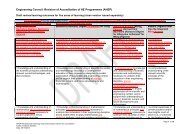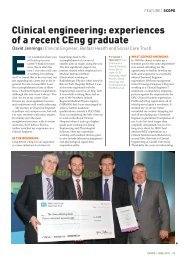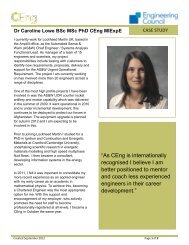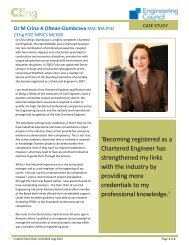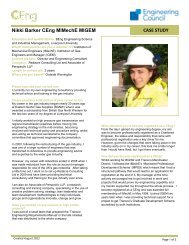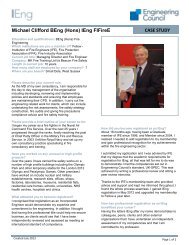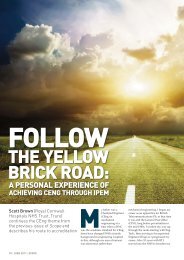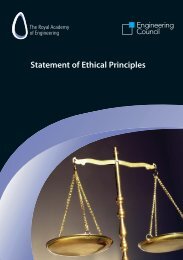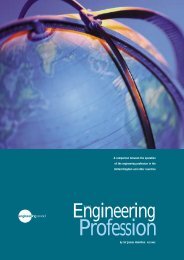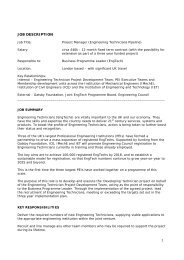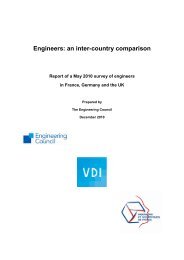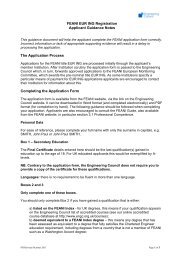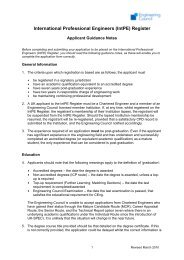An Engine for Change - A Chronicle of the Engineering Council
An Engine for Change - A Chronicle of the Engineering Council
An Engine for Change - A Chronicle of the Engineering Council
Create successful ePaper yourself
Turn your PDF publications into a flip-book with our unique Google optimized e-Paper software.
1988-1990: THE BARLOW YEARS 65support through funding, <strong>the</strong> donation <strong>of</strong> prizes and <strong>the</strong> organising <strong>of</strong> regional finals. <strong>An</strong>entrant on a previous occasion who had been supported by <strong>the</strong> ‘Who Wants to be aMillionaire’ campaign, had made such good progress with his own engineering business tha<strong>the</strong> was also awarded a prize from <strong>the</strong> Comino Foundation. The competition was wellsupported by national and local media.The Young <strong>Engine</strong>er <strong>for</strong> Britain national final <strong>for</strong> 1989 was again hosted by NationalWestminster Bank at its Old Banking Hall. Dial Industry Publications sponsored thiscompetition <strong>for</strong> <strong>the</strong> last time but Lloyd’s Register <strong>of</strong> Shipping and British Gas plc <strong>of</strong>feredsponsorship <strong>for</strong> future years. The coveted title <strong>of</strong> Young <strong>Engine</strong>er <strong>for</strong> Britain was won in1989 by Nigel Herbert <strong>for</strong> a pocket-sized viscometer. The event was again well covered by<strong>the</strong> national media. Prizes were presented by <strong>the</strong> EngC Chairman. The DES instituted a prize<strong>of</strong> £600 <strong>for</strong> <strong>the</strong> school entering <strong>the</strong> competition <strong>for</strong> <strong>the</strong> first time with <strong>the</strong> most imaginativeproject.The 1990 Young <strong>Engine</strong>er <strong>for</strong> Britain competition continued to be hosted by NationalWestminster Bank and sponsored, on this occasion, by this bank and Lloyd’s Register.Awards were presented by HRH <strong>the</strong> Duke <strong>of</strong> Kent. The winner was 13 year old BenScammell from Trent College <strong>for</strong> ‘Cookmate’, an electronic device indicating when abarbecue attains <strong>the</strong> correct cooking temperature.O<strong>the</strong>r Schools ActivitiesUnder Sir William Barlow’s chairmanship liaison continued with schools and school teachersat several levels. In May 1988, <strong>for</strong> instance, a conference was held with <strong>the</strong> AssistantMasters’ and Mistresses’ Association, building on <strong>the</strong> work previously undertaken withKing’s College London and Trent Polytechnic to consider <strong>the</strong> introduction <strong>of</strong> technology into<strong>the</strong> curriculum. Staff at King’s and Trent had been involved in preparing <strong>the</strong> ‘TechnologyEducation Project’ report. At <strong>the</strong> end <strong>of</strong> <strong>the</strong> year, also looking at curriculum issues, <strong>the</strong> EngCand <strong>the</strong> Royal Society promoted a national conference to explore progress on Advanced andAdvanced Supplementary (A and AS) levels. A Government Committee <strong>of</strong> Inquiry on thistopic, chaired by <strong>Council</strong> Member Dr Gordon Higginson, Vice-Chancellor <strong>of</strong> SouthamptonUniversity, had proposed broadening <strong>the</strong> base <strong>of</strong> post-16 education in schools to five subjectsbut <strong>the</strong> Government, unlike educationalists, employers and <strong>the</strong> EngC, had not accepted <strong>the</strong>main thrust <strong>of</strong> <strong>the</strong> Committee’s report. The Government was concerned over <strong>the</strong> considerablefunding implications that might have resulted from a consequential general leng<strong>the</strong>ning <strong>of</strong>university degree courses from three to four years so that students could achieve <strong>the</strong>traditional depth in specialist subjects. At <strong>the</strong> conference held in December 1988 Denis Filerand <strong>the</strong> Secretary <strong>of</strong> State <strong>for</strong> Education and Science made key-note speeches.During 1988 ‘A Co-ordinated Programme to Capture Young People’s Imagination’, dealingwith many aspects <strong>of</strong> <strong>the</strong> EngC’s work with schools and colleges in <strong>the</strong> 5-19 age group, waspublished as a policy review document. This addressed curriculum development, careers’advice and community involvement and proved useful in <strong>the</strong> work with Industrial Affiliatesand in guiding Nominated Bodies in <strong>the</strong>ir activities in schools. This topic had previously beendebated in April 1988 at <strong>the</strong> first <strong>Engine</strong>ering Pr<strong>of</strong>ession Forum, during Lord Tombs’s term<strong>of</strong> <strong>of</strong>fice, but at <strong>the</strong> end <strong>of</strong> 1988 <strong>the</strong> long-term funding <strong>for</strong> such work remained a problem.‘The Promotion <strong>of</strong> Modern <strong>Engine</strong>ering’ scheme <strong>for</strong>med part <strong>of</strong> <strong>the</strong> 5-19 programme tocreate an awareness <strong>of</strong> modern engineering among all young people. This scheme attemptedto extend <strong>the</strong> partnership with schools and colleges in collaboration with Government, local© <strong>Engine</strong>ering <strong>Council</strong> UK 2004



